#The United Federation of Planets
Explore tagged Tumblr posts
Text
My wife, when asked the age old nerd question “what would you do in star fleet?” gave the best answer.
She said she’d have worked for the HR equivalent in Star Fleet. This is brilliant. Of course there is someone looking over transfer requests and dealing with interpersonal issues (that eventually get sent to the councilors like Diana Troi). Who do you think sets up the concerts the senior staff puts on or deck 11 alpha shift’s production of Much Ado About Nothing? Who is giving day 1 orientation for transfers and setting up duty station sponsors for the newbies? It’s not gonna be a computer program or hologram. That’s too impersonal for Star fleet.
Now there probably also is a computer program that is logging, cataloging and shifting records around but it’s an algorithm that’s removes tedium, not replaces personnel.
Personally I want to see this team on a California class or even a tier 1 ship like the enterprise g. It would be so fun to see!
#star trek#star trek enterprise#starfleet#the united federation of planets#Star Trek ops track personnel divison
4 notes
·
View notes
Text
Its interesting that DS9 continues the Federation being similar to the borg in multiple ways, sure you have Eddington directly making that comparison, but theres also stuff like the USS Odyssey being destroyed because Dominion polaron weapons bypassed the shields, the next time they face the dominion, the federation have figured out how to upgrade their shields to negate that, Weyoun comments on how quickly the Federation negates the dominions considerable technological advantage.
17 notes
·
View notes
Text
More musings on utopia and the Federation as narrative device
The more I think about the streaming era of Star Trek, and Strange New Worlds kind of rubs our nose in the point, is that the point of the Federation was never to depict a perfect society. That would be narratively pointless.
What makes the Federation a great society is that it’s members are not perfectly ethical or aware of every salient fact at all times, but when they realize they’re wrong, they quickly pivot to the correct choice rather than go to their grave rationalizing why it’s okay to genocide a species it can’t directly perceive to improve the power and lifestyle of the Federation.
Critical decision makers in the Federation are capable of abdicating their moral duty to those in need out of fear or spite, but they are just as capable of swiftly moving to recognize the validity of very different life when given the correct information.
Anyone who has spent more than a few minutes online I suspect can recognize the magnitude of what it means simply to being open to changing one’s mind and admitting responsibility for allowing something heinous to happen. To not waste time making excuses and ensuring everyone knows you didn’t know any better rather than acting to solve the problem. To feel a responsibility for righting a situation you didn’t cause but did inherit and perhaps even benefit from.
If the average Starfleet officer has a superpower, it’s not that they’re super humanly more empathetic or have had the instinct for bigotry or selfishness purged entirely, it’s that their ego is just a smidge less aggressive. It’s not so overpowering that when confronted with irrefutable evidence of wrong doing, that they’ve failed to be the person Jean luc Picard knows they can be, that they can admit fault, and seek to right a wrong.
The Federation, for all the faults exposed by Discovery, Strange New Worlds, and Picard, is not a place that would rewrite textbooks to say that American style chattel slavery was no big deal in order to avoid feeling bummed out or obliged to address second order consequences of a historical wrong. Rather than say the Synths are exaggerating or their sentience is a clever fake, over a decade of policy is overturned almost immediately in the face of proof the Federation was wrong.
A very good episode is a tour of Plato’s cave. Moving from ignorance to knowledge but crucially when the one who has seen the outside returns, they are not rejected by their peers. The others don’t choose the comfort of their shadow puppets.
#star trek#star trek ethics#dystopia#utopia#the United federation of planets#Starfleet#strange new worlds spoilers#Picard#christopher pike#nyota uhura#una chin riley#augments#synths
12 notes
·
View notes
Text
New YouTube Shorts - Clips from latest Star Trek Video: How Does Federation Citizenship Works | Star Trek Theory
How does Federation Citizenship Actually Work in Universe? #startrek #startrektheory #shorts:
What we actually know about Federation Citizenship! #startrek #startrektheory #shorts:
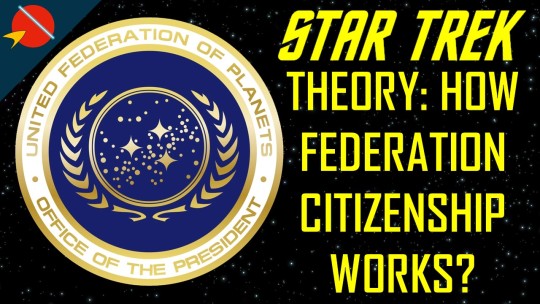
#star trek#federation citizenship#theory#star trek theory#the federation#the united federation of planets#youtube#shorts#youtube shorts#jonberry555
3 notes
·
View notes
Text
#romulan neutral zone#romulans#romulus#romulan star system#the united federation of planets#the federation#starfleet#the treaty of algeron#star trek tos#star trek the original series#the battle of cheron#serpents among the ruins#beta quadrant#star trek tng#star trek the next generation#star trek voy#star trek voyager#star trek ds9#star trek deep space nine#star trek picard#star trek pic#star trek#tv shows#sci fi#paramount plus#game rant
2 notes
·
View notes
Text
the Federation itself as a concept is so funny because the founding members are
the Vulcans, who have been friends with humanity for years but don't seem to actually like them all that much, instead regarding them with a sort of perverse fascination usually reserved for virology labs
the Andorians, who were fighting the Vulcans for like a hundred years
the Tellarites, who don't like any of these people and whose cultural trait is arguing, and
humans, whom nobody knew existed until last century when they shot themselves into space on a heavily modified nuke, invented world peace and won a fight with the nearest imperial superpower
like imagine you're the Romulan Empire and these weird monkeys who've barely figured out interstellar travel show up on your doorstep in the equivalent of a shipping container with missiles strapped to it, kick your ass in front of everybody, and then start a friendship club with 3 of your neighbours who all hated each others' guts until like a year ago. now I understand why every Romulan on the show is so angry
30K notes
·
View notes
Text
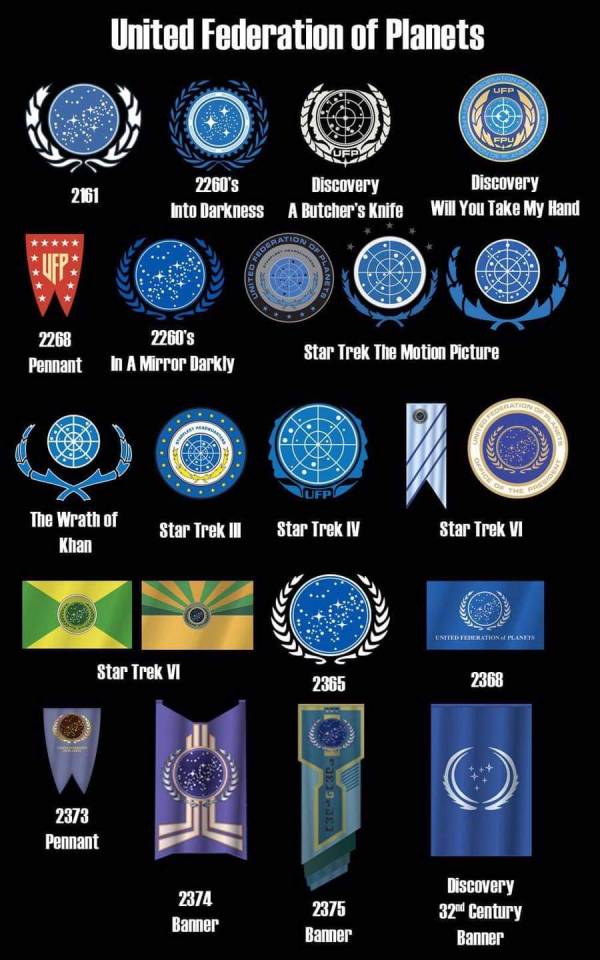
Star Trek be like, let's draw a slightly different flag every time and see if anyone notices
#star trek#star trek discovery#star trek aos#star trek the original series#star trek picard#star trek the next generation#deep space nine#ds9#united federation of planets
2K notes
·
View notes
Text
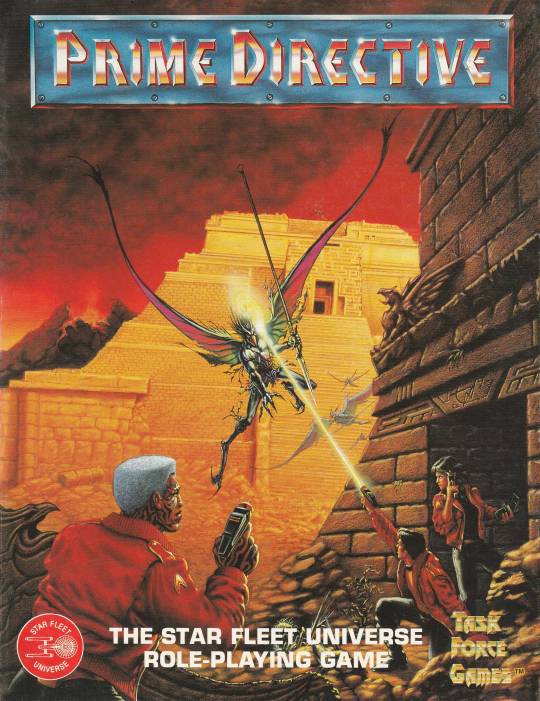
Battle at the Ziggurat -- David Menehan's cover for Prime Directive: The Star Fleet Universe Role-Playing Game, by Task Force Games, designed by Timothy D Olsen and Mark Costello (1993).
Prime Directive obviously is a Star Trek RPG, but one that does not mention "Star Trek" by name. It was published under the same license as Star Fleet Battles, granted to Stephen V Cole's Amarillo Design Bureau in the late 1970s by Franz Joseph, creator of the 1975 Star Fleet Technical Manual.
Like Star Fleet Battles, Prime Directive is focused on military actions. Player characters are members of a Federation Prime Team, an elite special forces unit assigned to the most dangerous missions.
Prime Directive describes a United Federation of Planets, phasers, and Vulcans, but you won't find Kirk or the Enterprise in this book, even in its detailed Star Fleet Universe Timeline. For that you need Star Trek: The Role Playing Game by FASA (1982-89), based directly on the original series, animated series, and first movie.
From Prime Directive:
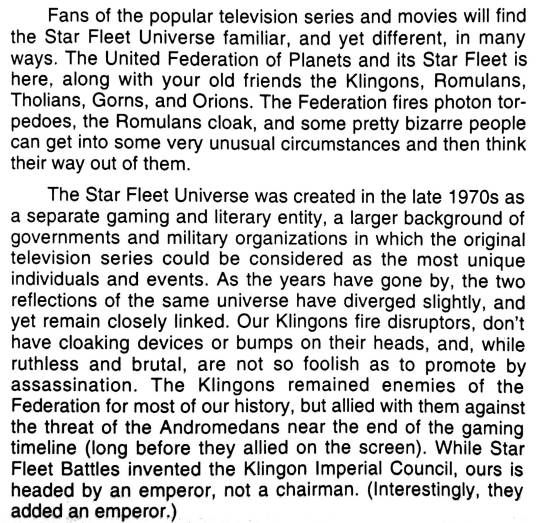
#Prime Directive#Star Trek#David Menehan#Star Trek RPG#sci fi#Star Fleet Universe#Task Force Games#Amarillo Design Bureau#Star Fleet#Star Fleet Battles#Timothy D Olsen#Mark Costello#Stephen V Cole#Franz Joseph#Franz Joseph Designs#Star Fleet Technical Manual#United Federation of Planets#ziggurat#phaser
211 notes
·
View notes
Text
On the one hand, Star Trek is a utopian future where you can do what you want for a living.
On the other hand, there’s something incredibly funny about Garak being a tailor despite there being no need for a tailor.
You can replicate clothes including their fit. You’re telling me a computer can’t get the exact measurements to a higher degree than a sentient being?
“I am but a simple tailor” oh honey there aren’t any of those
479 notes
·
View notes
Text
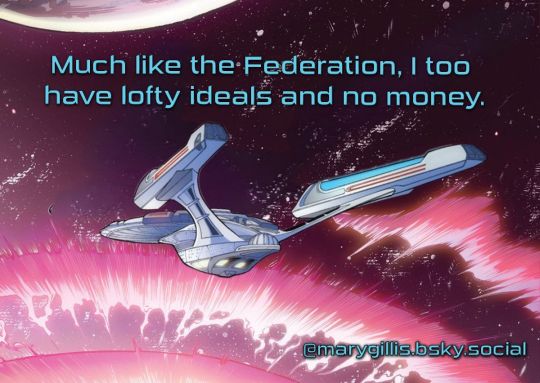
From a tweet by Mary Gillis
243 notes
·
View notes
Text
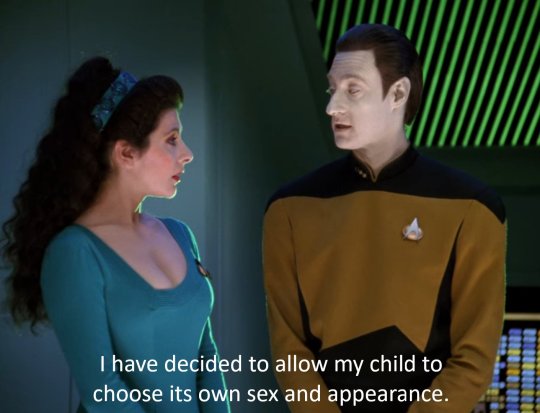
Data says trans rights
#trans#transgender#star trek#star trek tng#data#lal#trans rights#android#queer community#queer#commander data#starfleet#united federation of planets#lgbtq rights#lgbtq characters#lgbtq+#lgbtq community#lgbtqia#90s tv series#90s tv shows#beam me up scotty#i dont want to be here#this planet is awful
173 notes
·
View notes
Text
I gushed about the DS9 mirror universe in a previous post and how I feel the setting is more fluid than stories centered on the dominance of the Terran Empire, but I really do love the way it handles inverting and “mirroring” characters and concepts
“The names are the same, but the players are in different places” I think Prime Kira put it
The Federation and the mirror Cardassian Union are direct parallels. Both powers enjoy beneficial alliances with the Klingons and Bajor, and a severe dominance over Alpha Quadrant politics. The Alliance is on a larger scale essentially the mirror Federation of this era. Kira at the beginning of the series worried that the Federation would be just like the Cardassians. Oh the irony.
The TNG era is generally considered to be the Federation at its height, before the losses suffered at the hands of the Borg and the Dominion, at least. Meanwhile in the mirror universe, the Terrans, vulcans, and others are at their absolute lowest. They are in essentially the same position that the Bajorans were under the Cardassian occupation. And the Bajorans are, at least in part, among their oppressors.
Kira’s nemesis is Gul Dukat. The Intendant has Gul Dukat’s old job, and behaves similarly to him in many ways. Both Kiras are fundamentally the same person enough to understand each other, but in the ways that they differ are all traits that Intendant shares with Dukat. Kira is second in command of the station, under Sisko’s command. The Intendant commands the station, and Sisko works for her. The reversal of their egos is the most obvious, and the component Nana Visitor herself has commented on.
Prime Garak is an exile. Mirror Garak is still trapped in Cardassian military service, and seems miserable with it, much the way I imagine Prime Garak would have found himself eventually.
O’Brien has a loving family. Smiley has nothing. This very fact helps to inspire him to become a revolutionary. O’Brien knows what he lives for. Smiley has to find it.
Both Siskos “lost” Jennifer. One to the Borg, one or his own hubris.
Prime Bashir is a genius and a savant. Mirror Bashir is kind of a thug.
Prime Quark is arrogant and swaggering. Mirror Quark is timid and quiet, but also more outwardly kind. Too outwardly perhaps, considering he got caught, but we can’t fault him for doing the right thing.
Prime Worf was raised by humans. Regent Worf is all Klingon. If he knew the Rozhenkos, they were probably house servants or something. He was intentionally written to be like Gowron.
Similarly, Mirror Nog is very Quark-like.
The situation that the Rebellion finds itself in forces them to operate and conduct themselves VERY similarly to the Maquis, ironic considering how many of our Starfleet characters have mirror selves who are members of this Rebellion, and who in the prime universe, have opposed the Maquis. Sisko being the most prominent example. They even use more or less the same vehicles and weapons as the Maquis, and I think there are a few shared background actors between both groups, potentially the prime and mirror versions of the same peoples.
Similarly, Tuvok is a spy for Starfleet within the Maquis in the prime universe. He is genuinely 100% a rebel in the mirror universe. Both Tuvoks also have the same outfit in their wardrobe.
Prime Rom is relatively timid. Mirror Rom is fairly aggressive.
Ezri received the Dax symbiont in the prime universe. This never happened in the mirror universe, and the episode makes sure to emphasize this. She’s also tough, guarded, sassy, and aggressive where Prime Ezri is somewhat meek, fairly open, friendly, and usually cordial but does say what’s on her mind, bringing a similarity between her and her mirror counterpart. Mirror Ezri ultimately choosing to become a member of the rebellion could also be argued as a similarity.
Mirror Jadzia is unfortunately quite underdeveloped and boils down to mostly sleeping with people Prime Jadzia ordinarily doesn’t. But there is an interesting note to Mirror Jadzia seeming to be a more frivolous and carefree person (or at least fronting as such), while Prime Jadzia is a relatively more serious person, and while both engage in casual sex, Prime Jadzia is a lot more considered when it comes to starting long term relationships than her counterpart, who doesn’t see Bashir’s immaturity as an obstacle to his compatibility as a partner.
The mirror Klingons and Cardassians find success and dominance in aligning. In the prime universe they go to war, to their mutual detriment.
DS9 ends with the prime universe Cardassian Union brought low and made to suffer a form of ironic penance for their past sins at the hands of a greater fascist power than themselves, much like the fall of the Terran Empire. But where the Empire was conquered by the Alliance, Cardassia is brought back to its feet by the Federation.
I don’t know precisely how intentional any of this was but I found it fascinating.
Oh and Mirror Bariel has a personality.
#star trek#mirror universe#mirror verse#mirrorverse#star trek ds9#star trek deep space nine#benjamin sisko#mirror sisko#miles o’brien#smiley#intendant kira#kira nerys#regent worf#worf#jadzia dax#ezri dax#ezri tigan#tuvok#mirror garak#elim garak#gul dukat#jennifer sisko#federation#united federation of planets#terran rebellion#terran empire#klingon cardassian alliance#Cardassian union#Klingon empire#julian bashir
37 notes
·
View notes
Text

A size comparison of some Federation starships of note.
#Star Trek#Star Trek: lll: The Search for Spock#Star Trek Vl: The Undiscovered Country#Star Trek: The Next Generation#Star Trek: First Contact#Star Trek: Deep Space Nine#Star Trek: Voyager#U.S.S. Enterprise#NCC-1701-A#Constitution-class refit#NCC-1701-D#Galaxy-class#NCC-1701-E#Sovereign-class#U.S.S. Excelsior#NCC-2000#Excelsior-class#U.S.S. Defiant#NCC-75633#Defiant-class#U.S.S. Voyager#NCC-74656#Intrepid-class#Starfleet#Starfleet starships#starships#science fiction#United Federation of Planets
59 notes
·
View notes
Text
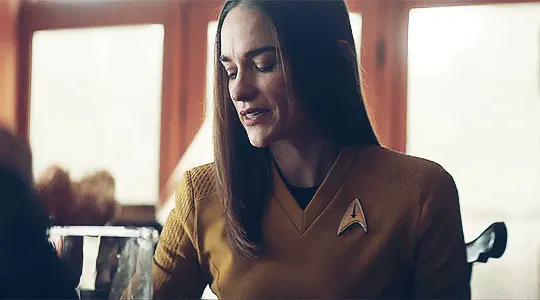
Gif from @telumendils
When I watched the second season of Star Trek: Strange New Worlds and Melanie Scrofano appeared, I was like: "Who is this beautiful woman on my screen?". Then I searched on the Internet and saw in her philology the series Wynonna Earp, which I had already heard of so I decided to stop and watch it at another time.
This month I decided to start watching and I've already watched 3 entire seasons (I watched the first one in just one day), because, what the hell, this series is incredible and it doesn't get the recognition it deserves.
Ps.: Now I live and breathe this character, because she's a bitch with a badass gun and gorgeous hair.

Gif from @dreamlonelywolf
#wynonna earp#melanie scrofano#star trek#star trek snw#star trek strange new worlds#captain batel#marie batel#wynonna earp x reader#captain pike#waverly earp#nicole haught#doc holliday#spock#una chin riley#snw#tv shows#jim kirk#fandom#united federation of planets#uss cayuga#la'an noonien singh
28 notes
·
View notes
Text
How Does Federation Citizenship Works | Star Trek Theory
youtube
#star trek#the united federation of planets#the federation#federation citizenship#citizenship#theory#star trek theory#youtube#video#youtube video#jonberry555#Youtube
1 note
·
View note
Text
I wonder if the reason why Bradward Boimler wasn’t published in the 30 under 30 article of the fleet magazine was because William Boimler and section 31 got involved to protect William Boimler.
It’s not like section 31 hasn’t gotten involved with shit like this before and interfered with both Starfleet and the wider federation.
#star trek#lower decks#star trek lower decks#bradward boimler#william boimler#section 31#uss cerritos#united federation of planets#starfleet
31 notes
·
View notes